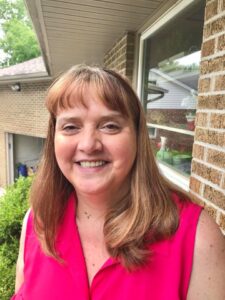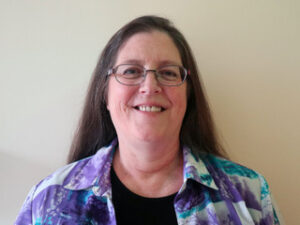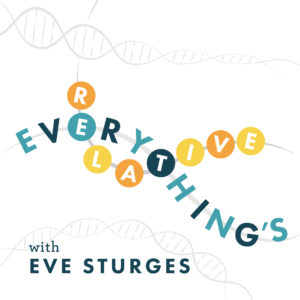 Tell me a little bit about your background, how you came to be interested in creating DNAngels, and how you educated yourself about genetic genealogy?
Tell me a little bit about your background, how you came to be interested in creating DNAngels, and how you educated yourself about genetic genealogy?
18 years ago, my aunt researched our Tippa family roots back to 1804, when these ancestors first sailed to America from Germany. My father surprised me with a beautiful bound book of this research as a gift, along with the story of how our last name was Americanized to Tippy. I loved sharing this history with my brothers, nieces, and nephews, relishing the sense of identity and family unity it brought me. I guess this is where my interest in genealogy really began.
In the Fall of 2017, I decided to create a similar keepsake of family history for my grandchildren as a Christmas gift. I already had an account with Ancestry and became familiar with using their data to access all types of records, such as birth, death, census, military, and marriage. It occurred to me the Ancestry DNA tests would include specific information regarding the actual regions of one’s ancestors, so I thought this would be a nice addition to include in their family tree book.
Nothing could have prepared me for what happened next.
Six weeks later, my test results arrived. As someone who loves family research, it was exciting to see so many relatives listed from first to fourth cousins! Searching for familiar names on my father’s side, I was confused as not one could be found. I decided to call a few Tippy family members who I knew for certain had also tested. They logged into their Ancestry account but did not see my results either.
In the back of my mind, the distant memory of a comment made by my uncle surfaced. He once told me my daddy could not father children, so none of his kids were biologically his. I brushed the comment off at the time, as my brown eyes were certainly the same as my father’s, making me confident I was his. Suddenly, my world turned upside down as I feared there may be some truth to what my uncle said.
The barrage of emotions I felt is still indescribable. As my entire identity was now in question, my world imploded. If I was not a Tippy, then who was I? Who is my biological father? What about my medical history? Does he know I exist? The questions were endless.
Luckily, due to my decades of interest in genealogy, I quickly located a genealogy group that taught me the science side of DNA. I learned to read centimorgans, interpreting the probable relationship between matches. They taught me to create mirror trees, linking matches to find grandparents. Since then, I’ve learned through doing and also networking with other genealogists for new ways to approach the more complex cases. The personal story of my being an NPE (not parent expected) was unknowingly grooming me to help others.
After the initial shock over my NPE status, the frustrations began. My mother refused to admit the truth to me or answer questions about my biological father. I now know this is an all too common occurrence within the NPE community for a variety of reasons.
Ultimately, through my genealogical skills, I was successfully able to determine who my biological father was. However, he passed when I was only 13 years old. Thankfully, my biological father’s widow welcomed me with open arms, paving the way to meet my six new-found brothers and answering many questions about him as a person and my new medical history. My relationship with these six men is still forming as we get to know one another. Even though we biologically share a father, we are still strangers in a way.
You began DNAngels fairly recently. How many people have you helped thus far?
We have accepted more than 1,000 cases and solved more than 900, so our ratio is a solid 9 out of 10 cases solved. Included in those numbers are our current year totals. We have accepted 400 this year and solved 333 year to date. Our goal is to find an answer for every client. However, there are times when someone may not have very many high matches, meaning we hit a brick wall. We must have at least a baseline in matches to even begin researching. We do ask many of our clients to upload their existing Ancestry DNA to three other “free” sites to maximize their matches. This often brings us a few new matches to consider. Other companies such as 23andMe can provide valuable insight but can also be cost prohibitive for some individuals. DNAngels hopes to eventually stock additional tests for our clients who may be financially struggling.
How do you describe the services you offer and what tools you use to help clients?
First, we provide a safe haven for those struggling with their NPE or adopted status. Once someone has been screened, we place them into our Facebook Client Room which is 100% closed to anyone other than our clients, angels, and support staff. Here, we encourage everyone to share their stories, offer support, and ask questions. It truly is a safe haven community where we all genuinely care for one another.
We are in the process of building a smaller, more intimate group for those who are truly hurting or have specific issues they are dealing with. DNAngels feels a strong sense of supporting our community and is ever evolving to meet those needs. We have a licensed clinical social worker (LCSW)—Mary McIntosh—on our team who can guide us should a client have an intense need. On occasion, we have found a client in urgent need of mental health services and she has intervened.
For tools, we use Ancestry as our foundation to begin our research. From there, we have a multitude of subscriptions to maximize our searches and provide contact information for potential family members to help clients prepare to contact biological families.
Do you help everyone who asks or do you have criteria?
We do have baseline requirements. Our requirements include the following: the presumption the parents reside in the United States; that the client has tested with Ancestry; that the client is willing to take an active role in the research process; and that the generally client must have matches that meet a certain number of centimorgan matches—three matches of at least 200 centimorgans with at least one tree—our starting point for research. Unfortunately, if someone only has very distant matches, it doesn’t offer us much to research. However, we do advise them of ways to help increase their odds and return if they discover new matches.
How many are you able to help relative to demand?
We turn very few away from DNAngels. I think the majority that don’t qualify are from another country or have yet to test with Ancestry.
How do you work with clients? Your website notes that it’s an interactive process. Can you describe that—what do you expect from clients?
Our search angels are volunteers. Many have full time careers and families, so we ask our clients to respond in a reasonable, timely manner or let our angels know if they need a temporary pause for a variety of reasons. Our team is spread out all over the US, allowing us to be respectful of various time zones and work schedules. We try to match angels up relative to client schedules and share information as we verify facts. In certain cases, some angels may have special interests or talents in specific cases.
While not required, nothing makes us happier for clients to check in once they’ve contacted their biological family. We genuinely want to remain a part of their journey as they bond with new relatives. We’re also mindful that not every ending is happy and we welcome all clients to continue being a part of our NPE and adoption community.
What kind of questions do clients typically ask when they’re interested in your services?
The first question is typically how much our services cost. DNAngels is a 501(c)(3) nonprofit organization, and we work entirely on a donation basis. We truly believe everyone deserves answers, regardless of their ability to pay. They also ask why we do what we do. Every member of the DNAngels team has been affected by DNA test results in some way, and we believe everyone deserves to have answers about their biological origins, regardless of their ability to pay. The work we do is so rewarding and also helps us all heal from what we’ve been through ourselves, and that’s what motivates us on a daily basis.
Are there reasons other than a lack of close matches that make some cases difficult to solve?
Definitely! The most common typical obstacle is when the biological mother is either deceased, forgets details, or refuses to divulge information and when there is more than one man who may be the potential father within a family. An example would be if a family had four sons relatively close in age and proximity to the mother during the time of conception and only 1-2 cousin matches are showing. Sometimes you need additional tests to confirm the biological father or siblings. We also commonly find a biological father may turn out to be an NPE as well, making the matches even more difficult to read. It is not uncommon for a cold case to have either multi-generational NPEs or the biological parent is a first-degree immigrant and records are slim and matches are few.
Are you ever able to find parents based on 4th cousin matches or more distant?
Yes, we can. If there are really good trees and multiple matches at the 4th cousin level, with excellent trees. We have special angels that can solve those. Laura is one. She is our lead angel and solves more than 50% of all cases at DNAngels.
In what ways do you provide support to your clients?
We understand that this is often a difficult time, and we never let our clients walk this journey alone. Our angel team is with the clients every step of the way, and providing an answer is just the beginning. We have a private client group on Facebook that is exclusive to our clients, where they can share their experience and support one another. We also offer 2 private support groups for our clients or anyone searching or in need of support. Our groups are DNAngels Search & Support, and Adoption Search & Support by DNAngels.
In what ways do they most need support? What are the most common issues you see?
Every client is different. Some are elated to finally find answers, while many have just had the shock of their lives and are devastated by this news. While family and friends often try their best to be supportive, they’re not able to understand how this discovery affects so many aspects of their lives. Just knowing that they’re not alone, and that every one of their feelings are valid, is so important during this difficult time. In addition, the LCSW on our angel team offers private sessions with our clients at no cost. We also have a pastor who is available for clients who need spiritual support.
Many of our adopted clients have grown up knowing they were adopted, so I would have to say the NPE community’s most common emotional need is overcoming the shock of finding out their identity isn’t really what they thought. This affects each person differently. Some people take it in stride; others it shakes to their very core. Many feel anger over being lied to, while others discover hurtful secrets and must work through this. Again, this is why we stress staying active within our community. Every person has something in common with another, and we don’t ever want our clients to feel alone.
Do the angels ever act as intermediaries?
We strongly encourage our clients to make contact with their biological family, but we review this on a case by case basis and will support the individual to the best of our ability.
Do you advise clients about how to make contact?
Absolutely! Making that first phone call or writing that first letter can be a daunting task. We offer support and guidance every step of the way and are there for the client regardless of the outcome.
What’s the rough breakdown of your clients by adoptees, NPEs, and donor-conceived people, and has that changed over time?
The majority of our clients are NPE, I’d say roughly 60%. Adoptees account for the majority of the remaining 40%, with only a handful of donor-conceived individuals needing ours services this year.
Are you looking for additional volunteers? If so, what criteria are there to be a DNAngel?
As we grow, we do look for additional volunteers. We are very selective with our angels and accept new volunteers on an as needed basis, and, occasionally, if someone really wows us with their passion and commitment. Not only do we require certain genealogical skills, we also have a set methodology we use for consistency. Angels also must work well with our team, and if they have a unique skill or passion, we try to incorporate it into our research.
Our team also consists of individuals who do screening, fundraising, web development, graphics, content writing, research, and provide emotional support, as well as several other functions. We value the many talents of our volunteers to help our vast community and meet a multitude of needs.
What else would you want readers to know or understand about DNAngels?
The overwhelming necessity for NPEs and adoptees to know where their biological roots originate is deeper than most can ever understand. We are committed to helping these individuals find their answers and offer dedicated support throughout their journey. We never require payment to accept a case, as we feel this is a basic human right for each person to know their biological roots. However, the resources required to sustain these efforts cost thousands of dollars each year. Eventually, as demand increases, we hope to support a very small staff for continuity in addition to meeting the cost of our yearly subscriptions, software, additional DNA tests, training opportunities for our volunteers, website maintenance, and office supplies.
 Providing Additional Support
Providing Additional SupportMary McIntosh is a clinical social worker who provides therapeutic services for DNAngel clients who need extra support. As her family historian, she helped others with their genealogy for more than 40 years. “It was a hobby that turned into a passion when DNA testing became more widely available to the public,” she says. As a therapist, she’s worked with clients who are adopted as well those who are NPEs. She’s been been a part of DNAngels for the last year, volunteering her skills at DNA mapping trees and therapeutic consulting. To further her expertise in this field, she’s enrolled in a doctoral program and describes her dissertation topic as “therapy and NPEs and all that comes with that journey.”
Finding out about DNA surprises, “often causes upheaval to one’s identity of self, confusion as to why and how it happened, reevaluation of family and sense of belonging, and arouses other emotions including joy, grief, and anxiety. Reactions from others is often unpredictable, and life just feels like someone pulled the rug out from under you.” McIntosh has seen firsthand the highs and lows that go with this journey, she says, noting, “This is where support, both formal and informal, is needed.” DNAngels, she says, are present to their clients through that initial stage until they’re better able to cope or are able to access local support.
FOR MORE INFORMATION:
DNAngels
5920 Giant City Road, Unit A, Carbondale, IL 62902
Info@dnangels.org
Follow on Twitter @DNAngels4, on Instagram @DNAngelsorg, and on Facebook. BEFORE YOU GO…
Look on our home page https://severancemag.comfor more articles about the search and reunion, NPEs, adoptees, and genetic genealogy.
 Tell me a little bit about your background, how you came to be interested in creating DNAngels, and how you educated yourself about genetic genealogy?
Tell me a little bit about your background, how you came to be interested in creating DNAngels, and how you educated yourself about genetic genealogy?
 In her new podcast, Everything’s Relative, writer and therapist Eve Sturges talks with individuals whose lives have been upended by DNA surprises.
In her new podcast, Everything’s Relative, writer and therapist Eve Sturges talks with individuals whose lives have been upended by DNA surprises.